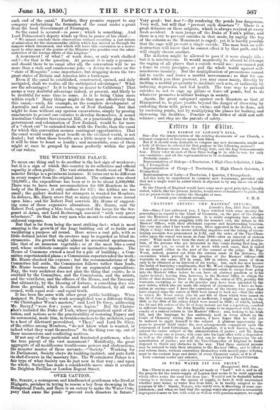THE WESTMINSTER PALACE
To mean one thing and to do another is the last sign of weakness ; but it is a sign of which this country in its collective and official capacity is often guilty. The vast-structure South-west of West- minster Bridge is a prominent instance. It turns out to be different in every respect from the original intent. The estimate was about 78,000L; the expenditure has been or is to be about 2,500,0001. There was to have been accommodation for 460 Members in the body of the House; it only suffices for 437; the lobbies are too small ; the gallery destinea for strangers is wanted for Members. In defence, Mr. Barry avers that so many alterations were forced upon him ; and Sir Robert Peel convicts Mr. Hume of suggest- ing some of those expensive alterations. Mr. Hume, said Sir Robert Peel, quoting a blue book, suggested the house for the Ser- geant at,Arms, and_ Lord Besborough assented "with very great reluctance." So that the very man who meant to enforce economy enforced expense. But that is far from being the most striking feet.: what is most amazin& is the growth of the huge building out of so feeble and vacillating a purpose all round. Here arises a vast pile, with so little defined intent that its erectors may be regarded as blind in- struments. Its growth might almost be accounted spontaneous, hie that of an immense vegetable; or at the most like a coral reef, whose architects conspire under an instinctive impulse. The House of Commons owned a need for a pile of building ; a Com- mittee superintended plans ; a Commission superintended the work; Mr. Hume checked the expense : but the recommendations of the Committee fall aside, the Commission follows rather than leads, Mr. Hume becomes the channel for an augmented expenditure. Nay, the very architect does not plan the thing that exists; he is overlaid by the Committee, and the Commission, and the artists, and the ventilator, and the officers of the House, and the Treasury. But ultimately, by the blessing of fortune, a something does rise from the ground, which is claimed and disclaimed, by all con- cerned, with equal zeal—and equal truth.
It has been the same with other great public buildings. Wren designed St. Paul's—the work accomplished was a different thing. "Sir Christopher Wren's masters," said Lord De Grey, addressing Mr. Barry, "were few ; yours were legion." But Sir Christo- pher's included the Duke of York, whose pragmatical spirit of dic- tation, and notions as to the practicability of restoring Papacy and its ceremonial, made him, in troublesomeness to the architect, equal to a host of dilettanti proveditori. "They," said Lord Be Grey, of the critics among Members, "do not know what is wanted, or indeed what they want themselves." So the thing rose up, out of these unconscious and conflicting motives.
If not any of these particular and frustrated gentlemen, who is the true parent of the vast monument ? Manifestly, the great aggregate of all meddlesome troublesome powers and obstructions, the monster master of these servants—" Society." Working for its Parliament, Society obeys its building-instinct, and puts forth its chef-d'ceuvre in the masonry line. The Westminster Palace is a fair type of what Society can do just now in that way ; and upon the whole, Society has made a considerable move since it evolved the Brighton Pavilion or London Regent Street.


























 Previous page
Previous page